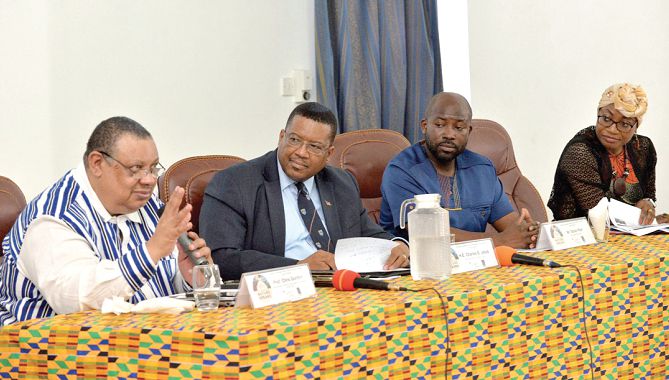
Local universities urged to overhaul curricula
A former Director of the Institute of Environment and Sanitation Studies (IESS) at the University of Ghana, Professor Chris Gordon, has called on universities in the country to take immediate steps to overhaul their curricula and make them more relevant to contemporary development needs.
He said the courses should be designed to promote personalised learning, which is a new paradigm where students are able to balance hard core knowledge with soft skills that would place them in a better position to manage the country’s resources.
Advertisement
"The business-as-usual approach used in our universities presently has not worked for us and so those of us in our 60s have failed the country. But, things must change because information needs are fast changing and we cannot continue producing the same kind of graduates like we have been doing,” he said.
Lecture
Prof. Gordon made that call at the annual Prof. Alexander Adum Kwapong Memorial Lectures in Accra last Thursday.
The lecture was organised by the United Nations University Institute for Natural Resources in Africa (UNU-INRA) in collaboration with the University of Ghana.
It was dubbed, ‘Nature Speaks’ and was held on the theme: “Innovation, transition and disruption in natural resource management: the role of the African university”.
The event was attended by participants from academia, industry, civil society and policy makers.
Progressive curriculum
Prof. Gordon said universities needed a curriculum that was industry-led and practical rather than the current situation where students were taken through a straight jacket approach and merely fed with information from lecturers.
"The time has come to create room for students to challenge facts and change the culture of silence and to make them think properly. We need graduates who will be fit for purpose and think beyond the sustainable development goals (SDGs)," he said.
He said it was unacceptable that in spite of the abundance of natural resources that Africa had and the fact that it controlled 30 per cent of the world's natural resources, the continent had not been able to leverage technology to give it a competitive advantage.
Prioritise research
He stressed that there was the need for universities to also create a high quality research climate to produce graduates who had the needed capacity to tackle the country's developmental challenges.
That, he said, required increased spending on research in science and technology-based courses.
"We are not spending enough on tertiary education in Ghana. As I speak only 0.03 per cent of the national budget is spent on tertiary education and this falls short of the African Union (AU) target of one per cent of the national budget," he added.
He said it was important for a trans-disciplinary approach to be adopted in research to make findings relevant and crosscutting for related parties.
Prof. Gordon also called on scientists in Ghana and the African continent to improve on their game and be relevant at the world stage in terms of using research and technology to tackle development challenges.
"In terms of science and innovation, our scientists are not at the table at all and even if they are, we do not contribute. We are in a situation where we have to do things differently now," he stressed.
Paradigm shift
For his part, the Chief Executive Officer of the Chamber of Bulk Oil Distributors, Mr Senyo Hosi, said the country’s abundant natural resources had not been properly harnessed and put to good use because of our poor human resource quality.
He underscored the need for universities to take bold steps to produce students who had critical thinking skills and the right attitude to lead in various areas of the economy.
"We cannot continue to allow mediocrity to control our thoughts. African voices are not heard at the world stage because our universities do not have visibility,” he said.




